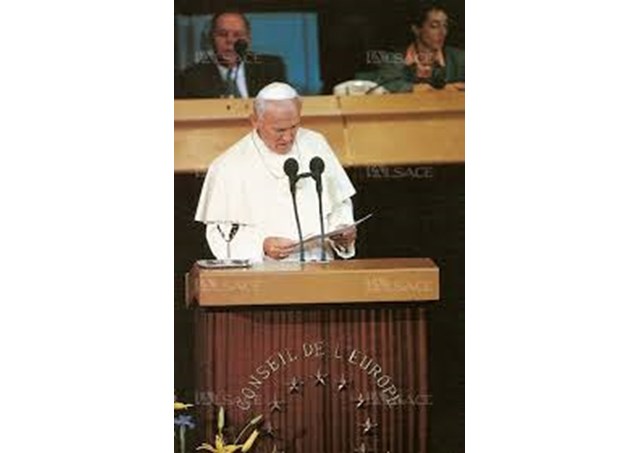
When Saint John Paul II called for European integration

(Vatican Radio) This is a story that has an all European flavour to it. It relates to the visit of Pope Francis to the French City of Strasbourg on Tuesday 25th November 2014 to address both the European Parliament and the Council of Europe. But the spotlight is on the papal backdrop to it, in a special way on the words of Saint John Paul II, the last Roman Pontiff to address the Parliamentary Assembly of the Council of Europe. An occasion during which he also addressed the European Commission and the European Court of Human Rights.
Listen to a programme presented and produced by Veronica Scarisbrick:
In this programme Veronica Scarisbrick brings you some sound clips from his address to the Parliamentary Assembly on October 8th, 1988 beginning with a passage in which he refers to the visionary spirit which fired the founding fathers of Europe following the world wars. Among whom, says John Paul II, Robert Schumann who had this key intuition: “To serve humanity liberated of hatred and fear, and rediscover after long divisions, Christian brotherhood”.
On this occasion Pope John Paul also highlights the Christian roots that lie at the heart of European culture and society and appeals for freedom of conscience and religious liberty. As we know the European scenario was very different at the time with its 12 member states compared to the current 28. The Berlin Wall was still standing and the iron curtain dividing East and West was still very much in place.
But on this October day in Strasbourg the Pope from Eastern Europe was not afraid to raise his voice to express the hope that European integration gain the whole continent: “If Europe wishes to be true to itself it must contrive to gather together all the strengths of this continent in respect of the characteristics of each nation while finding in its roots a common spirit. “
Earlier in the address the Polish Pontiff had prepared the ground for the call to put Eastern Europe back into the wider picture of the continent as he mentioned the geography of its cultural roots, from Flanders to Italy, from Portugal to Sweden and from the banks of the Rhine to the banks of the Danube.
But getting back to his call for a more united Europe this is what he said: “The member countries of your Council are aware they do not represent the whole of Europe. In expressing the deep desire to see the cooperation between nations which is already etched out, intensified in a special way with Central and Eastern Europe, I feel I am meeting the desire of millions of men and women who know they share a common history and who hope for a future of unity and solidarity on the scale of this continent”.
When John Paul II addressed the Assembly it had recently adopted a resolution calling for respect of religious beliefs in the East and when on that same day he spoke to the European Commission and the European Court of Human Rights, this time in English he focused on the Holy See’s interest in the Council: “In this solemn setting I cannot but reaffirm the Church’s deep concern for matters relating to human rights and freedom. The Church’s commitment in this field corresponds fully to her religious and moral mission. The Church vigorously defends human rights because she considers them a necessary part of the recognition that must be given to the dignity of the human person created in the image of God and redeemed by Christ."
Just over a decade earlier this time in a message dated January 26th, 1977, another Roman Pontiff, Blessed Paul VI also had words for the Council of Europe which had just opened its headquarters in Strasbourg: “The Holy See looks to the future of Europe with realism and hope. The conditions and the social, cultural, legal and spiritual needs of the peoples of Europe are in its eyes valuable indications to awaken consciences and to define the field in which they can exercise their creative dynamism”.
So when on Tuesday November 25th, 2014 Pope Francis travels to Strasbourg his words to Europe will certainly be couched in relation to a totally different historical context to the days of Blessed Paul VI and Saint John Paul II. Clearly however he will refer to the Christian roots of Europe as he addresses not just those present but 500 million Europeans, possibly reiterating the thought of the Polish Pontiff 26 years ago when he included in his address those who do not adhere to any religious creed.
| All the contents on this site are copyrighted ©. |


